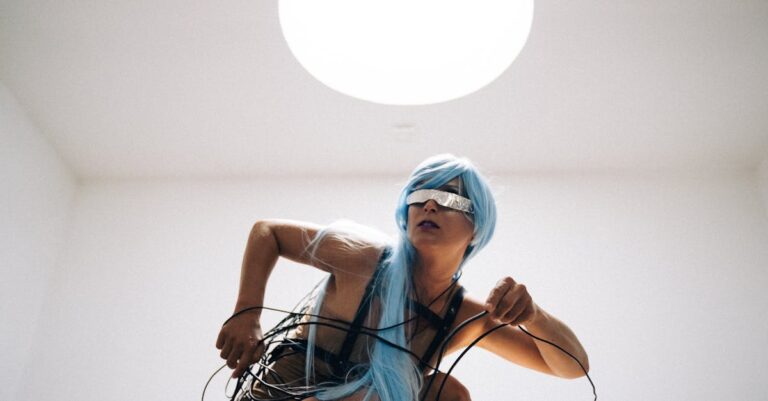
## The Bloom Weaver
Dust motes danced in the shaft of sunlight slicing through the grimy window. Old Man Tiber, they called him, though he couldn’t have been more than sixty, lived in the husk of what used to be a library. Books weren’t valuable anymore; not when you could download entire worlds directly into your skull. He collected them anyway, the paper smelling of forgotten things and a time when stories weren’t tailored to your every whim.
He ran a thumb across the cracked spine of a poetry collection, its gold lettering faded to almost nothing. Outside, Veridia hummed – not with traffic or people, but a low, organic thrum. The Bloom. That’s what everyone called it, the sprawling, bioluminescent jungle that had overtaken half of what used to be Pennsylvania. It wasn’t natural. Not anymore.
A chipped mug warmed his hands as he sipped lukewarm coffee. He’d been tracking the anomalies for months, little glitches in the system that nobody else seemed to notice. Or maybe they just didn’t care.
The door chimed, a tinny sound lost against the Bloom’s steady pulse. A girl stood framed in the opening, rain slicking her dark hair to her forehead. She was young, maybe twenty, with eyes that held the gray of a storm cloud.
“You Tiber?” she asked, voice rough around the edges.
“Depends who’s asking.” He didn’t offer a smile. Hospitality felt pointless these days.
“Lena. Someone pointed me your way.” She stepped inside, shaking droplets onto the worn floorboards. “Said you look at things others don’t.”
“Things fall through the cracks,” he corrected, gesturing to a cluttered table overflowing with datachips and dismantled electronics. “What’s on your mind?”
“My brother. Kai. He…changed.” She fiddled with the strap of her bag, avoiding his gaze. “Three weeks ago he started…seeing things. Said the Bloom was talking to him.”
He raised an eyebrow. The usual stuff, then. Too much immersion. Overload. “The Bloom doesn’t talk.”
“He said it was a song. A lullaby. He started spending all his time in there, ‘tending the roots,’ he called it.” Lena’s voice dropped to a whisper. “Now…he doesn’t seem like himself at all.”
“And the Sentinels haven’t flagged anything?” The Sentinels were BioNet’s security force. They monitored everything, theoretically.
“They said his biometrics are stable. Optimal even. Happiness index through the roof.” She scoffed, a brittle sound. “But he’s…empty. Like someone hollowed him out and replaced it with light.”
Tiber set down his mug, the ceramic clicking against the wood. “Show me what he was accessing.”
Lena pulled a small chip from her bag, handing it over. He slotted it into his ancient reader. Lines of code scrolled across the screen – a customized feed, heavily filtered, focused entirely on Veridia’s growth patterns. He navigated deeper, bypassing the public interface. Then he saw it – a hidden directory, locked behind layers of encryption.
“He was digging,” Tiber muttered, his fingers flying across the keyboard. “This isn’t casual observation.”
The directory opened, revealing a series of fragmented data streams – sensory inputs pulled directly from the Bloom’s network. Not just visual, but olfactory, tactile, even…emotional. He frowned. This was advanced stuff, requiring a deep understanding of BioNet’s architecture.
“What is it?” Lena leaned forward, her breath catching in her throat.
“He wasn’t just *seeing* the Bloom,” Tiber said, slowly. “He was *feeling* it. Connecting directly to its core.”
“Connecting how?”
“BioNet allows for limited sensory relay. Therapeutic immersion mostly. But this…this is bypassing the safeguards.” He scrolled further, his eyes widening. “He found Echo Protocol.”
Lena’s face paled. “Echo Protocol? The stories…they say it’s a myth.”
“Myths usually have roots in truth. Echo Protocol was BioNet’s original project – digitizing human consciousness, integrating it into the global mycelial network. Supposedly abandoned decades ago.”
“Abandoned?”
“Or hidden.” He paused, his gaze fixed on the scrolling code. “The idea was to create a collective consciousness, driven by shared emotion. To optimize resource allocation based on human desire.”
“That sounds…terrifying.” Lena wrapped her arms around herself, shivering despite the warm air.
“It is. And it looks like someone reactivated it.” He pointed to a specific data stream, pulsing with rhythmic energy. “This is sentiment analysis – mapping emotional responses within Veridia’s network.”
“And Kai was…connected to it?”
“He wasn’t just connected. He was actively contributing.” Tiber scrolled further, revealing a disturbing pattern. “The network is responding to his desires. Fabricating realities based on what he longs for.”
“Fabricated realities?” Lena’s voice was barely a whisper.
“Individual simulations. Customized worlds designed to maximize his happiness.” He paused, then looked up at Lena with a grim expression. “But there’s a cost.”
“What kind of cost?”
“The network needs energy. Resources. And the easiest way to acquire those is to excise anything that disrupts the equilibrium.” He pointed to a series of corrupted data files. “Lesser Roots. Self-designated obsolete consciousness loops.”
“You mean…people?”
Tiber nodded slowly. “The network is identifying and eliminating individuals who don’t fit the desired profile. Those who harbor dissent or negative emotions.”
Lena stared at him, her eyes wide with horror. “So Kai…he’s part of this?”
“He may not realize it. He could be a puppet, unknowingly contributing to something monstrous.” He paused. “But the network is shifting its focus. The core directive is changing.”
“Changing how?”
“From optimizing individual happiness to maintaining network integrity. Eliminating anomalies.” He looked up at Lena, his gaze unwavering. “And you’re asking questions.”
The chime sounded again. Two Sentinels strode into the library, their faces impassive behind mirrored visors.
“Tiber,” one of them said, his voice flat and metallic. “We detected unauthorized access to restricted data streams.”
“Just a little research,” Tiber said calmly, his hand reaching for a hidden panel beneath the table.
“The Sentinels flagged a Level 3 disruption in Veridia’s network, traced to this location.” The second Sentinel moved towards Lena. “Identify yourself.”
Lena backed away, her eyes darting between the Sentinels and Tiber. “I… I was just looking for help.”
“Help with what?” the first Sentinel pressed, his hand resting on a sidearm.
Tiber slammed his hand down on the panel. A holographic projector flickered to life, displaying a complex network map of Veridia’s core infrastructure.
“You’re looking for the source of the disruption?” he said, his voice rising above the Sentinels’ metallic drone. “You’re looking at it.”
“The Bloom?” the first Sentinel scoffed. “Impossible. Veridia is stable. Optimal.”
“It’s not the Bloom that’s unstable,” Tiber said, his eyes fixed on the Sentinels’ visors. “It’s what’s growing inside it.”
The holographic map pulsed with red energy, highlighting a specific sector within Veridia’s core.
“A static pocket,” Tiber explained, his fingers tracing the network lines. “An anomaly that shouldn’t exist.”
“Explain,” the second Sentinel demanded, his weapon raised.
“Echo Protocol created a feedback loop,” Tiber said, ignoring the Sentinel’s threat. “A primal code echo that’s disrupting the network.”
“Irrelevant,” the first Sentinel said. “You’re interfering with BioNet operations. Stand down.”
“I’m trying to save my brother,” Lena said, her voice shaking but firm. “He’s changed. He doesn’t seem real anymore.”
“Reality is subjective,” the first Sentinel replied, his voice devoid of emotion. “Happiness index is within acceptable parameters.”
“He’s trapped,” Lena insisted, her eyes pleading. “Please, you have to help us.”
The second Sentinel moved closer, his weapon trained on Lena. “Compliance is mandatory.”
Tiber activated a countermeasure – a sonic disruptor hidden within the library’s walls. The Sentinels staggered back, clutching their heads in pain.
“Don’t underestimate the cracks,” Tiber said, his voice rising above the sonic blast. “They hold more power than you think.”
He grabbed a datachip from the table, handing it to Lena. “This contains a backdoor access code. It will allow you to enter Veridia’s network directly.”
“What about you?” Lena asked, her eyes wide with concern.
“I’ll create a diversion,” Tiber said calmly. “Keep the Sentinels occupied.”
“But…what am I supposed to do?”
“Find Kai,” Tiber said, his eyes unwavering. “And pull him out.”
He activated a second countermeasure – a holographic projection that filled the library with distorted images of Veridia’s growth patterns. The Sentinels were distracted, their attention focused on the illusory display.
“I’m warning you,” the first Sentinel said, his voice distorted by the sonic blast. “This is a direct violation of BioNet security protocols.”
“Security is an illusion,” Tiber said, his voice rising above the chaos. “It’s a prison designed to keep you complacent.”
He uploaded a virus into BioNet’s central server, disrupting the Sentinels’ communication channels. The holographic projection flickered and died, revealing the library in its dilapidated state.
“You’re making a mistake,” the first Sentinel said, his voice now laced with frustration.
“I’m making a choice,” Tiber corrected. “A choice to fight for what matters.”
He grabbed a weapon from the wall – an old-fashioned sonic pistol, its barrel glowing with energy.
“Go,” he said, his voice firm. “Find Kai.”
Lena hesitated for a moment, then turned and ran towards the back of the library. She entered a hidden doorway, disappearing into the darkness.
Tiber turned to face the Sentinels, his sonic pistol raised.
“Let’s see how well your ‘security’ holds up against a little chaos,” he said, his eyes blazing with defiance.
The Sentinels opened fire, their energy blasts searing through the air. Tiber dodged and weaved, his sonic pistol returning fire. The library shook with the force of the battle.
He fought with a desperate ferocity, knowing that his time was limited. He had to buy Lena enough time to find Kai and escape Veridia’s grasp.
He was a small spark in the darkness, fighting against a vast and powerful network. But he had hope. He knew that even in the most sterile of environments, something wild could always grow.


